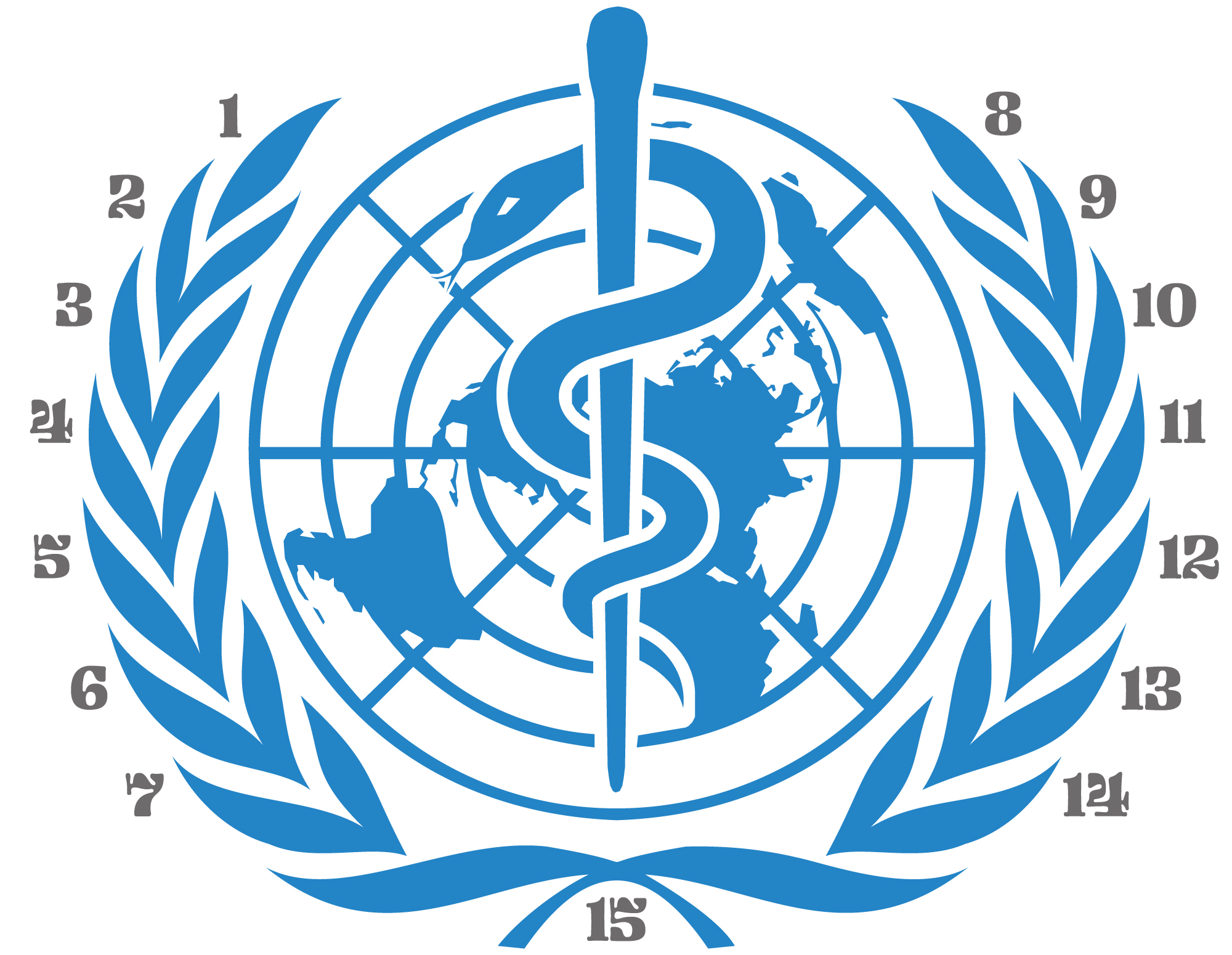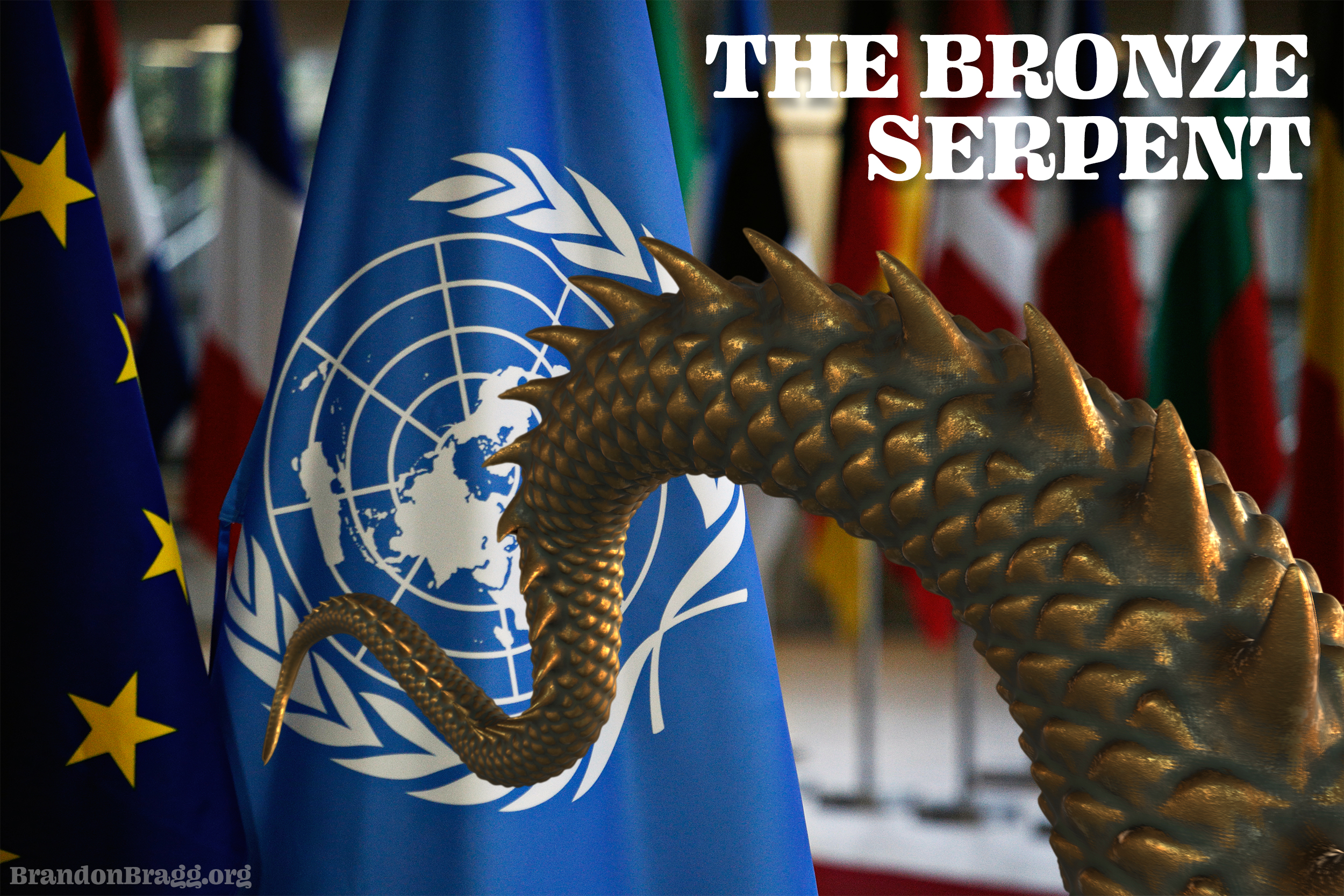The Bronze Serpent
I am excited to share with you a thought-provoking exposé that may change your perspective on the Coronavirus pandemic. My journey of discovery began one day as I asked the Lord to teach me what He wanted me to learn in this season so I could help others in finding their way through the storm. Over the next few days, the Lord began to reveal parallels between what I was witnessing in modern news with that of Biblical history. One such example was the proliferation of the emblem for the World Health Organization. I decided to do some research on its history as well as an in-depth Biblical word and symbol study on the components within the emblem. I believe my findings reveal a Biblical word in season for the crisis at hand, so much so that I have experienced many spiritual attacks which have attempted to prevent me from publishing. I am thankful to the Holy Spirit and for Him sending ministering angels to strengthen and encourage me not to abandon this project. I give the Lord all of the credit and I plead the blood of Jesus over you as you read this encouraging message.
In 1948, the First World Health Assembly designed the WHO emblem by combining the United Nations logo with the iconic staff and coiled snake symbol, which is often associated with medical professions. The emblem designers self-reportedly thought it would be a clever way to pay homage to Greek mythology (1). They didn’t realize that the symbol was originally authored by God for the removal of a plague and the remission of sins incurred by the Israelites in the twenty-first chapter of the book of Numbers. It is a short story tucked quietly away in the Old Testament that tells of the Coronavirus antiserum’s secret ingredient.
It is my opinion that the WHO symbol was a predictor of the future events we now see, a memorial to the time it happened before, and the remedy for which the world so desperately searches.

I find it fascinating that the worldwide pandemic, which we have only imagined through movies until now, would be called Corona, a Latin word for crown. The Greek word for corona is kotinos, a symbol that has remained a typology of dominance and power throughout history, dating back to the ancient Olympic Games in 776 BC. A corona is a garland or wreath made from the branches of a wild olive tree and intertwined to form a circle or horseshoe. These coronas were presented to the victors of the ancient Olympic Games to be worn as crowns. Notice the garland that encircles the UN and WHO emblems. That is a corona.
Moving our attention to the center of the WHO emblem, we see the bronze serpent and pole that God commanded Moses to erect in Numbers 21:4-8. You may be asking yourself, “What do poisonous snakes and the Coronavirus have in common?” A lot, actually. Scientists have now been able to determine why the Coronavirus is so deadly. While studying the virus under microscopes, pathologists discovered that the protruding nodules surrounding the virus act like hooks that cling to fabrics, hair, and lung tissue. They described the hooks as the fangs of a snake. What makes this virus so aggressive is that it latches onto its host and will not let go.

I was shocked when I learned of this report. All I could see were tiny little snakes passing from person to person and latching onto them. I love problem solving, so felt inspired to watch a few online videos on the subject, “How to remove an active snake bite.” Again, I was just as shocked when I discovered the answer. Simply apply hand sanitizer or mouthwash to the snake’s open mouth and it will immediately unlatch and release its victim. And just like the applied Biblical principle of washing in the Word, it works every time. All of these discoveries have major Biblical significance and application that point to Jesus, who has all authority to heal the sick, raise the dead, and end the Coronavirus. Now, without further ado, let’s dive into scripture so we can explore how these things are reconciled in the Word of God.
Then they journeyed from Mount Hor by the Way of the Red Sea, to go around the land of Edom; and the soul of the people became very discouraged on the way. And the people spoke against God and against Moses: “Why have you brought us up out of Egypt to die in the wilderness? For there is no food and no water, and our soul loathes this worthless bread.” So the LORD sent fiery serpents among the people, and they bit the people; and many of the people of Israel died.
Therefore the people came to Moses, and said, “We have sinned, for we have spoken against the LORD and against you; pray to the LORD that He take away the serpents from us.” So Moses prayed for the people.
Then the LORD said to Moses, “Make a fiery serpent, and set it on a pole; and it shall be that everyone who is bitten, when he looks at it, shall live.” So Moses made a bronze serpent, and put it on a pole; and so it was, if a serpent had bitten anyone, when he looked at the bronze serpent, he lived.The Book of Numbers 21:4-8
The Backstory: A Public Relations Nightmare
I feel sorry for Moses and Aaron. Scholars believe that the total number of Israelites who left Egypt during the exodus, including women, children, and old men was approximately 2.4 million people (2). For comparison, that is roughly the total amount of US citizens living in the city of Chicago, which is the third largest city in the United States. Imagine being the mayor of a city that large with almost every person having a grievance against you. It’s a public relations nightmare. But that’s not all. The Lord told Moses and Aaron they would not be entering the promised land back in chapter 14 (verses 30-32). This meant that reelection was out of the question and they would not be given keys to the city. God reminded them of this sad truth again in chapter 20 (verse 12) when the Lord told Moses to speak water out of the rock, which accompanied them, but he disobeyed and struck it twice. Even though God had always provided more than enough for the people, they continued to complain, and this time they took it too far.
Strike Three Fifteen
The punishment that would soon befall the Israelites might have felt to them like strike three. But from God’s perspective, it was actually strike fifteen! A few chapters earlier, God told Moses that “not one of those who saw my glory and the signs I performed in Egypt and in the wilderness but who disobeyed me and tested me ten times—not one of them will ever see the land I promised on oath to their ancestors. No one who has treated me with contempt will ever see it” (Numbers 14:22-23). Here is a review of chapters leading up to the bronze serpent, the sum of which account for fifteen times the collective congregation of Israelites tested the Lord:
- 11 – Amalekites and the Canaanites Defeat Israel (14:40-45)
- 12 – The earth swallows up the men of Korah (16)
- 13 – The Next Day Plague (Numbers 16:41-50)
- 14 – Grumbling People / Water from the Rock (20:1-13)
- 15 – The Bronze Serpent (21)
Why is the number fifteen significant? The UN and WHO emblems each have exactly fifteen sections of olive sprigs on the corona, with the fifteenth and most prominent sprig at the bottom of the emblem, pointing up towards the bronze serpent, signifying its historical and yet current relevance to the health pandemic.

Fifteen times the Israelites took up crowns against the Lord by exalting themselves. To braid a corona crown requires a healthy olive tree, time, and skill. God gave the Israelites an abundance of time, talent, and treasure, and patiently waited to see how they would use it. But they consistently tried to use gifts from the Lord as weapons against Him. The symbolism of braiding reminds me of the time Jesus cleansed the temple courts. While patiently observing the commercialization of the sacrificial offering, He took the time to braid a whip before exercising His wrath (John 2:14-16). So, what caused the Lord to send poisonous snakes among the Israelites? It’s not so much what they did, but rather, what they said out of the abundance of their hearts.
Unpacking the Lesson
“The soul of the people became very discouraged.”
Jesus said, “You shall love the Lord your God with all your heart, with all your soul, and with all your mind” (Matthew 22: 37). In other words, love the Lord with all your emotions, thoughts, and choices. We all get discouraged from time to time, but it is in times of uncertainty, conflict, and resistance that God tests our character to determine our level of trustworthiness – and He promotes the trustworthy.
Sometimes, learning from bad examples can be just as effective as learning from good ones. Here, we can learn from a bad example about the consequences of hardening our hearts to the Lord. The danger grew in proportion to the dissatisfaction that mounted within the hearts of the Israelites because we know that, “Out of the abundance of the heart the mouth speaks” (Matthew 12:34). And, “Death and life are in the power of the tongue, And those who love it will eat its fruit” (Proverbs 18:21).
“The people spoke against God and against Moses.”
This was a big no-no. I’ve been guilty of using sour words when I’ve been upset and I repent from speaking foolish idle words, but there is never an excuse for using the Lord’s name in vain. I feel sick to my stomach when I hear people misuse God’s name because they don’t realize that words have power and they curse themselves by speaking the words of the adversary. Here, the Israelites referred to God with the Hebrew word be·lo·him. It might as well have been a curse word because it literally means against God. That word may look familiar because it is a derivative of the Hebrew word Elohim, which is a plural word for the living God. The people understood the concept of the plurality of God, which we refer to as the Holy Trinity.
“There is no food and no water, and our soul loathes this worthless bread.”
I can’t believe the Israelites lied about not having food, especially after getting in trouble for collecting too much. “The Israelites called the food manna. It was like coriander seeds. It was white and tasted like wafers made with honey” (Exodus 16:31). “The people would go around and gather it, then grind it in a handmill or crush it in a mortar. They would cook it in a pot or make round loaves of bread out of it. It tasted like rich pastry made with olive oil” (Numbers 11:8). This sounds like the perfect superfood, packed with macronutrients, everything they needed to be healthy and strong. Plus, the Bible describes it as eating delicious pastry cakes, and they didn’t even have to eat their vegetables.
The Lord provided this bread from heaven as a symbol and foreshadowing of the sweet, saving grace of Jesus Christ. Jesus said, “I am the living bread that came from heaven. Whoever eats this bread will live forever. The bread I will give to bring life to the world is my flesh” (John 6:51). The Israelites had been invited to the Lord’s supper table to partake in communion with Him, but they disrespected the Lord of Hosts as well as His eternal covenant to us through Jesus, the Bread of Life.
When I was a kid, if you disrespected mom’s cooking, you didn’t eat. I’m amazed at the choice of words used by the Israelites. Here are the Hebrew words for loathsome, worthless, and bread.
- Loathsome (ka·tzah): detestable, abhorrent, or sickened with dread
- Worthless (hak·ke·lo·kel): wretched, miserable, contemptible
- Bread (bal·le·chem): bad bread, bad food
I don’t know about you, but if I had said that to my mother, she would have washed my mouth out with soap, which is what we must do to the poisonous serpents that try to latch onto us through hard-heartedness. Our praise and worship to the Lord repels the enemy and he has no choice but to release his grip and flee back into darkness.
Jesus said, “Which of you, if his son asks for bread, will give him a stone? Or if he asks for a fish, will give him a snake?” (Matthew 7:9-10) The emphasis in these questions surrounds the word ask. The Word says “Ask and you shall receive” (7:7) and “You have not because you ask not” (James 4:3). The apostle Paul reminds us, “Be anxious for nothing, but in everything by prayer and supplication, with thanksgiving, let your requests be made known to God” (Phillipians 4:6). But the Word also says, “Do everything without arguing or complaining” (Philippians 2:14). Moses warned the people when he said, “The Lord, the Lord God, merciful and gracious, longsuffering, and abounding in goodness and truth, keeping mercy for thousands, forgiving iniquity and transgression and sin, by no means clearing the guilty, visiting the iniquity of the fathers upon the children and the children’s children to the third and the fourth generation” (Exodus 34:6-7).
“So the Lord sent fiery serpents among the people, and they bit the people; and many of the people of Israel died.”
Many of the people died and those bodies had to be removed in order to prevent the spread of disease. This was particularly inconvenient since Moses had just given them new instructions about handling dead bodies. Chapter nineteen specifies that if anyone was to come into contact with a dead body, they were to remain in quarantine for 7 days. Sometimes, we must sleep in the bed we make for ourselves. In this case, the Israelites were confined in quarantine with the very snakes that were killing them. My dad once told me, “There’s no such thing as an atheist in a foxhole.” Sometimes, God allows us to back ourselves into a corner with nowhere to look but up and ask for help. The Israelites were suffering the consequences of consistently operating in opposition to God and the authority He ordained through Moses. They could have avoided a lot of pain and anguish by trading their spirit of heaviness for a garment of praise (Isaiah 61:3).
I will never forget the time I was bitten by a snake. It was a four-foot-long python and it was one of the most painful experiences I have ever endured. I’m not ashamed to admit that I screamed like a little girl as it sunk its fangs into my hand. I’m thankful it was not poisonous, however, my whole hand felt like it was on fire. The only way I can describe it was as if my hand was made of metal and it was glowing red from the heat of a fiery furnace. Waves of pain pummeled like a hammer against an anvil. As days passed, my hand began to cool down but became rigid, much like hot metal when removed from the forge. There was a point when I couldn’t move it at all. I’m so thankful that I fully recovered. I spent a lot of time in prayer during that ordeal, but I remember feeling a sense of peace, knowing that my experience would not be wasted. I believe that it was, largely in part, for the very purpose of this message.
“Therefore the people came to Moses, and said, ‘We have sinned, for we have spoken against the Lord and against you; pray to the Lord that He take away the serpents from us.’ So Moses prayed for the people.”
This time, the people spoke to Moses about God with respect and reverence. The Hebrew word they used for the Lord was Yah·weh, which is defined as the proper name of the God of Israel. They acknowledged their sin, confessed and repented for speaking evil things against the Lord, and submitted to God by submitting to their spiritual authority, who was Moses.
The Israelites were applying what the Lord would later instruct King Solomon to do in the midst of a plague when He said, “If my people, who are called by my name, will humble themselves and pray and seek my face and turn from their wicked ways, then I will hear from heaven, and I will forgive their sin and will heal their land” (2 Chronicles 7:14).
“Then the Lord said to Moses, ‘Make a fiery serpent, and set it on a pole; and it shall be that everyone who is bitten, when he looks at it, shall live.’ So Moses made a bronze serpent, and put it on a pole; and so it was, if a serpent had bitten anyone, when he looked at the bronze serpent, he lived.”
Here is where things get very interesting for my narrative as a researcher. I decided to do a Biblical word study on the significance of bronze as a metal, especially as it related to the custom and culture of the Israelites. Bronze was used to make censers because it withstood high heat and it would not rust. Also, unlike steel, bronze will not generate dangerous sparks when being stuck against a hard surface.
Earlier, we learned what happened during strike twelve: The earth swallowed up the men of Korah. They led a rebellion against Moses by challenging his position and claiming rights to the tabernacle of the Lord. So, Moses instructed the men, all two hundred and fifty of them, to bring censors filled with incense to the tabernacle so the Lord would choose which of them was holy. Then the Lord caused the earth to split open, consuming the households of all who were part of the rebellion, closed the earth back over them, and then consumed the two hundred and fifty men with fire from heaven (Numbers 16:1-40). Then, the Lord told Moses, “The censers of these men who sinned against their own souls, let them be made into hammered plates as a covering for the altar. Because they presented them before the Lord, therefore they are holy; and they shall be a sign to the children of Israel” (Numbers 16:38).
When the Lord told Moses to set a serpent on a pole, Moses understood what materials to use and chose the same bronze used to make the sensors and altar overlays, all of which represent atoning sacrificial offerings and memorials to the Lord.
Much like a snake bite, the most common symptoms of the coronavirus have been described as burning and aching. The Israelites who had been bitten and living in quarantine may have felt like they were coming out of the crucible as they looked upon the first crucifix, acknowledging their sin and remembering that it should have been them. This was a foreshadowing of Passover and the cross Jesus Christ bore for our sins. Like Passover, the Israelites were confined to quarantined isolation while death claimed anyone who would not acknowledge and accept the atoning sacrifice. Jesus died on Passover, taking upon Himself the sins of the world for our forgiveness and freedom.
Most people know John 3:16, but the two verses that precede this famous verse point all the way back to the bronze serpent. Jesus said “And as Moses lifted up the serpent in the wilderness, even so must the Son of man be lifted up: That whosoever believeth in him should not perish, but have eternal life” (John 3:14-15).
When referencing these events that took place in the wilderness, the apostle Paul wrote, “Now these things occurred as examples to keep us from setting our hearts on evil things as they did” (1 Corinthians 10:6).
The Antiserum for Covid-19
If you have been bitten by the poisonous serpent called Corona or live in fear of the future, I have good news for you. There is a cure. Just follow these Biblical steps and experience the presence of God infiltrate your spirit with His perfect love and affection towards you. If you have never made a decision to follow Christ, now is the time. Your confession of faith will ensure that your name is written in the Lambs Book of Life, which means you no longer have to live in fear of anything. The Holy Spirit desires our time and attention because He loves us and wants us to succeed in the purposes for which we were created. He wants to assign angels to protect you and minister to you on your journey. If you believe in Jesus and want to receive the free gift of eternal life, pray this prayer out loud, even if it’s just a whisper. I’ll say it with you.
- Jesus, I humble myself and acknowledge that I have a sinful nature which separates me from you and disqualifies me from eternity with you in heaven.
- I confess you as my Lord and Savior because you sacrificed yourself and died on the cross for my sins. Your blood cleanses me from all sin and shame and makes a way for me to come boldly before your throne of Grace.
- I believe you died, were buried in a tomb, and rose again to life on the third day, defeating the curse of death, hell, and the grave. I ask and invite you to fill me with your Holy Spirit and be Lord of my life. Refresh and restore my spirit, soul, and body.
- I will read your Word so my faith will grow. This will bring health to my body and nourishment to my bones (Proverbs 3:8). (The Book of Romans is a great place to start)
- I will actively pursue a growing personal relationship with you through prayer and staying connected to other Christians.
A great way to stay connected to other Christians is through small group participation through your local church or through Free Chapel. My wife and I volunteer as small group leaders, but there are countless other groups that meet in person and online. Here is a list of current small groups at Free Chapel: https://www.freechapel.org/groups
If you feel stuck and you’re looking for Christian fellowship, feel free to contact me directly and I will help you get connected, wherever you are in the world.
If you are a Spirit-filled believer, be encouraged. No weapon formed against you shall prosper. During the great commission to His disciples, Jesus gave us a commandment, a covenant, a warning, and a promise. So, fear not, because He has overcome the world and we walk in that same victorious authority through the power of His shed blood, which cleanses us from sin, purifies our hearts, and brings us into everlasting communion with our heavenly Father.
“Go into all the world and preach the gospel to every creature. He who believes and is baptized will be saved; but he who does not believe will be condemned. And these signs will follow those who believe: In My name they will cast out demons; they will speak with new tongues; they will take up serpents; and if they drink anything deadly, it will by no means hurt them; they will lay hands on the sick, and they will recover” (Mark 16:15-18).
Sources
UPDATE: 4/23/20
If you want to dive in deeper, check out this powerful message from Jentezen Franklin:
